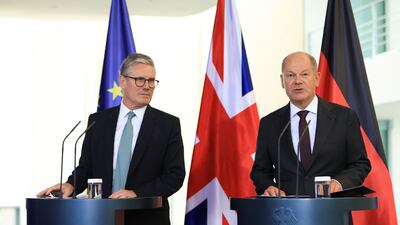For a bit of fun, I turned to social media this week with the following question: “If [UK Prime Minister] Keir Starmer reversed Brexit, which of the Brexit benefits would you miss the most?” On one social media platform alone, there were 2.6 million views and a lot of comments mostly ridiculing Brexit.
Yet since the Brexit vote was in 2016, you may wonder why eight years later anyone still cares. The answer is that the damage remains. My feeble joke – which everyone seemed to understand – is that there are no tangible “Brexit benefits” but plenty of downsides. British tourists (including me, my family and friends) have suffered long summer queues at European airports at our favourite holiday destinations.
There’s been an enormous increase in paperwork and trade bureaucracy, congestion at airports and seaports, endless lines of trucks at the port of Dover, and other barriers to the UK’s trade and financial dealings with our nearest neighbours and close friends. Some sarcastic social media respondents spotted one supposed Brexit “benefit”, namely that “Brexit has destroyed the Conservative party for a decade”. The party’s in-fighting continues with a dispiriting battle to find a new leader.
But it has been the summer hassles at airports that struck a chord, and they will get worse in the autumn with new regulations, checks and visa costs for the British. Right now, travelling to the EU means every British passport must be checked and stamped, whereas EU passport holders move quickly in shorter lines. At one EU airport I travelled to in August (I won’t say which one to spare the border guards from criticism) the queues of British arrivals were so long that the border police did not look in detail at the passports. Instead, they robotically stamped them as quickly as possible to clear the backlog.
Brexit is back in the news for political reasons, too.
Mr Starmer visited Germany last week and will be meeting other European leaders to pursue a policy vaguely described as “resetting” Britain's relationships with European countries. It’s vague because Mr Starmer keeps repeating his election campaign pledge that he is not in the business of overturning Brexit. So what will he do? Some commentators give Mr Starmer credit for at least recognising the problem. Negotiating a new deal now with the EU bureaucracy could take years and so meeting national leaders is a better way forward.
Last week, Mr Starmer met Olaf Scholz in Germany – the biggest economy and a key player in Nato. Goodwill visits to France, Italy, Spain and other EU nations will presumably follow. But almost no one is entirely pleased with his recalibration of UK-EU relations.
A few remaining significant Brexit supporters have platforms on right-wing newspapers and TV talk shows where they protest that Mr Starmer is somehow deviously undermining British democracy. They mean the flawed 2016 referendum and the even more flawed Brexit deal that resulted. And those flaws seem more obvious as time goes by. I was never impressed with the idea of souring relations with our closest neighbours based on vacuous slogans and grievances about miraculously “taking our country back”.
Instead, future British historians will possibly see Brexit as one of the most damaging and unnecessary policy errors made by any British government since the Suez Crisis of 1956, and the appeasement of Adolf Hitler in the 1930s.
Mr Starmer made a gloomy speech recently about the many economic and other problems he inherits. It is therefore understandable that he wishes to avoid re-opening the Brexit wound. But the wound remains an open sore anyway. Personal relationships with key European countries can be markedly improved. From Germany’s Chancellor Scholz to France’s President Emmanuel Macron and even Italy’s Giorgia Meloni, there is a commonality of interest in having better agreements with Britain. And I also take comfort that British political history is full of policy errors that have been corrected – even if it sometimes takes years.


Back in 1815, Westminster passed the Corn Laws. These put high tariffs on grain imports from Europe and elsewhere. This benefited wealthy British landowners and their cheerleaders in the Conservative party but the price of bread rose so high that rioting in urban areas was common, especially among impoverished industrial workers. It took 31 years for the hated Corn Laws to be repealed in 1846. That paved the way for the Victorian industrial boom, the modernisation of Britain and a deep split in the Conservative party.
The demoralised 2024 Conservative party is already deeply split and the next leader may find the job extremely difficult since the splits and political faultlines remain. Mr Starmer meanwhile seems to be planning for Labour to have not just five but even 10 years in Downing Street. History never truly repeats itself, but the lessons of British history do suggest that, as with the Corn Laws, pragmatism eventually defeats ideology. For now, anyway, my unscientific poll of social media users suggests that searching for Brexit benefits is as useful as searching for a unicorn.


